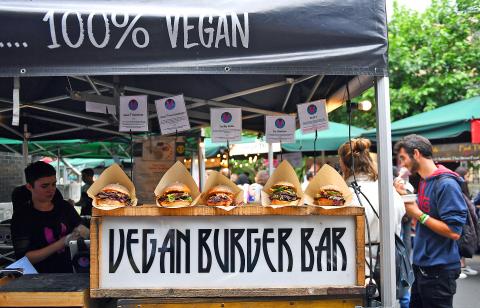It’s not vegan, it’s “plant-based.” So will carnivores bite?
As companies try to cater to Americans’ interest in lighter eating, the term “plant-based” is replacing “vegan” and “vegetarian” on some foods. The worry is that the v-words might have unappetizing or polarizing associations.
Impossible Foods, which makes a meatless patty that’s supposed to taste like meat, even warns restaurants not to use those words when describing its burger on menus.

Photo: AP
“For many people, their notion of a vegan is someone who’s wagging a finger at them if they eat any animal products. I’m vegan. But for a lot of people that term, it’s almost like a cult,” says Pat Brown, CEO of Impossible Foods, whose burger is served in about 3,000 locations including White Castle.
The trendier sounding “plant-based” may appeal to a broader market, since “vegan” or “vegetarian” could alienate those who don’t adhere strictly to those diets. “Plant-based” may also distance products from a perception of vegan and vegetarian food as bland.
Since “vegan” is used to convey what’s not in a product, it can be associated with deprivation, says Michele Simon, executive director of the Plant Based Food Association, an industry group founded in 2016. “Plant-based,” she says, has a more positive connotation because it explains what is in a food.

Photo: EPA
“I think there’s room in the market for both terms,” says Simon, who notes that some companies still proudly use “vegan.”
The terms vegan, vegetarian and plant-based are not specifically regulated. But vegetarian typically means meatless, while vegan means no animal ingredients at all, including milk or eggs.
When referring to a specific food or product, “plant-based” usually means the stricter vegan definition, though that may not always be clear. When referring to broader eating habits, it usually means a diet focused on vegetables but may also include meat or fish. That lack of clarity is why the Plant-Based Foods Association plans to develop a definition for the term.

Photo courtesy of Tony Webster
Beyond Meat, another meatless patty maker, also avoids the words vegan or vegetarian in hopes of winning over carnivores. It pushes to have its products sold in the meat sections of supermarkets, rather than in what the company calls the “penalty box” of the frozen vegetarian foods section.
And in the coming weeks, a new liquid egg substitute will arrive in grocery stores with the bottle saying it is “made from plants.” Just Egg, which will be sold alongside cartons of eggs, will not have the word “vegan” on it.
“(Plant-based) has become more associated with foods that actually taste good,” says Josh Tetrick, CEO of Just.
MorningStar Farms, a more established vegetarian brand, continues to use “veggie” and “vegan” because those terms are understood by most people and help prevent confusion about whether ingredients such as eggs are used, says Dick Podiak, a marketing executive at Kellogg, which owns the brand.
But MorningStar Farms is also increasingly incorporating the term “plant-based” into its marketing. Podiak says the company wants to communicate that its products fit into the “plant-based” lifestyles people may read about in magazines or hear about from dietitians.
Nik Contis of the branding agency PS212 says the term “plant-based” might be more broadly appealing, but that some may see it as just a new term for an old concept.
“If there’s a person who is never going to eat a ‘veggie’ burger and you put a ‘plant-based’ burger in front of them, I don’t think they’re all of a sudden going to say, ‘Oh I’m going to eat that’,” he said.

In the March 9 edition of the Taipei Times a piece by Ninon Godefroy ran with the headine “The quiet, gentle rhythm of Taiwan.” It started with the line “Taiwan is a small, humble place. There is no Eiffel Tower, no pyramids — no singular attraction that draws the world’s attention.” I laughed out loud at that. This was out of no disrespect for the author or the piece, which made some interesting analogies and good points about how both Din Tai Fung’s and Taiwan Semiconductor Manufacturing Co’s (TSMC, 台積電) meticulous attention to detail and quality are not quite up to

April 21 to April 27 Hsieh Er’s (謝娥) political fortunes were rising fast after she got out of jail and joined the Chinese Nationalist Party (KMT) in December 1945. Not only did she hold key positions in various committees, she was elected the only woman on the Taipei City Council and headed to Nanjing in 1946 as the sole Taiwanese female representative to the National Constituent Assembly. With the support of first lady Soong May-ling (宋美齡), she started the Taipei Women’s Association and Taiwan Provincial Women’s Association, where she

It is one of the more remarkable facts of Taiwan history that it was never occupied or claimed by any of the numerous kingdoms of southern China — Han or otherwise — that lay just across the water from it. None of their brilliant ministers ever discovered that Taiwan was a “core interest” of the state whose annexation was “inevitable.” As Paul Kua notes in an excellent monograph laying out how the Portuguese gave Taiwan the name “Formosa,” the first Europeans to express an interest in occupying Taiwan were the Spanish. Tonio Andrade in his seminal work, How Taiwan Became Chinese,

Mongolian influencer Anudari Daarya looks effortlessly glamorous and carefree in her social media posts — but the classically trained pianist’s road to acceptance as a transgender artist has been anything but easy. She is one of a growing number of Mongolian LGBTQ youth challenging stereotypes and fighting for acceptance through media representation in the socially conservative country. LGBTQ Mongolians often hide their identities from their employers and colleagues for fear of discrimination, with a survey by the non-profit LGBT Centre Mongolia showing that only 20 percent of people felt comfortable coming out at work. Daarya, 25, said she has faced discrimination since she